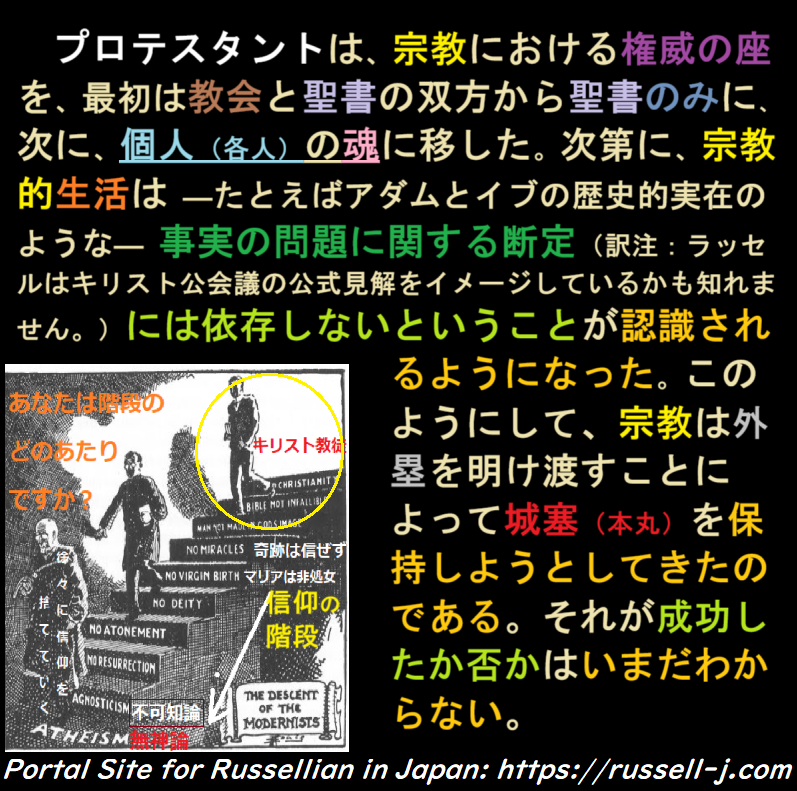
プロテスタントは、宗教における権威の座を、最初は教会と聖書の双方から聖書のみに,次に個人(各人)の魂に移した。次第に、宗教的生活は ―たとえばアダムとイブの歴史的実在のような― 事実の問題に関する断定(訳注:ラッセルはキリスト公会議の公式見解をイメージしているかも知れません。)には依存しないということが認識されるようになった。このようにして,宗教は外塁を明け渡すことによって城塞(本丸)を保持しようとしてきたのである。それが成功したか否かはいまだわからない。
Protestants transferred the seat of authority in religion, first from the Church and the Bible to the Bible alone, and then to the individual soul. It came gradually to be recognized that the religious life does not depend upon pronouncements as to matters of fact, for instance, the historical existence of Adam and Eve. Thus religion, by surrendering the outworks, has sought to preserve the citadel intact -- whether successfully or not remains to be seen.
Source: Religion and Science, 1935, chapt. 1
More Info.:https://russell-j.com/beginner/RS1935_01-070.HTM
<寸言>
欧米にはキリスト教を信仰する人々が多数いますが、その信仰の程度は人それぞれです。中には、無神論者や不可知論者に転じた人もいます。添付画像は、キリスト教徒の信仰の程度(段階)を「信仰の階段」として視覚化したものであり、示唆に富んでいます。階段の最上段には熱心な信者が位置し、信仰の度合いが弱まるごとに階段を降りていくことになります。
キリスト教において重要とされる「奇跡への信仰」を失えば、「キリスト教徒としては」かなり階段を降りることになります。たとえば、イエスを産んだマリアが処女であったという教義を信じられなくなれば、その信仰の低下に応じた分、階段を降りることになります。やがて、キリスト教徒としての信仰箇条を全て信じられなくなり、神という存在そのものも信じられなくなれば、無神論者となります。一方で、神の存在も非存在も証明できないとする立場は不可知論者(agnostics)です。バートランド・ラッセルは、自分は理論的には(理論哲学者としては)不可知論者であるが、実際的には(一人の人間としては)無神論者であると述べ得ており、私も共感します(ただし、私はキリスト教徒であったことはありません)。
日本では、一神教を信じる人は少なく(注:キリスト教徒は国民の約1%)、多神教的な信仰や自然宗教的な感覚が文化として深く根付いています。仏教は形式的には広く受け入れられていますが、いわゆる「葬式仏教」として、冠婚葬祭などの儀礼の場面に限定されることが多いのが実情です。
特定の宗教を信じているという人に対し、その信条や教義について理論的に問い続けていくと、時に本人自身が何を信じているのか分からなくなることもあるのではないでしょうか。もちろん、教団関係者であれば「信じなさい、信じる者は救われる」と言うでしょうが、そうした姿勢は、問いや懐疑を封じ、思考よりも従順さを重視するという点で、かつての日本軍の精神主義と通じるものがあるように思えます。
In Western countries, there are many people who believe in Christianity, but the degree of their faith varies from person to person. Some have even become atheists or agnostics. The attached image visualizes the varying levels, or stages, of Christian faith as a "Staircase of Belief," and it offers much food for thought. At the top of the stairs stand devout believers, and as one's level of faith weakens, one metaphorically descends step by step.
Losing belief in miracles, which are regarded as essential in Christianity, means descending significantly on this staircase from the standpoint of being a Christian. For instance, if one can no longer believe in the doctrine that Mary, the mother of Jesus, was a virgin, that marks a step down in faith. Eventually, if one comes to reject all the central doctrines of Christianity and ceases to believe in the very existence of God, one becomes an atheist. On the other hand, those who claim that neither the existence nor non-existence of God can be proven are called agnostics. Bertrand Russell stated that he was an agnostic in theory (as a philosopher of logic), but in practice (as an individual), he was essentially an atheist, and I share that sentiment, though I have never been a Christian myself.
In Japan, belief in monotheistic religions is rare (note: Christians make up about 1% of the population), and polytheistic beliefs and a natural-religious sensibility are deeply embedded in the culture. Buddhism is widely accepted in a formal sense, but in reality, it often functions as what is called "funeral Buddhism", appearing mainly in ceremonial contexts such as weddings and funerals, rather than in daily life.
When someone who claims to follow a particular religion is repeatedly questioned about its doctrines or creeds from a theoretical standpoint, it may sometimes happen that they themselves become uncertain about what they actually believe. Of course, a religious authority might respond with, "Just believe, those who believe will be saved." However, such an attitude suppresses questioning and doubt, and prioritizes obedience over thinking, something that, in my view, bears a resemblance to the spirit of militarism once seen in the Japanese army.